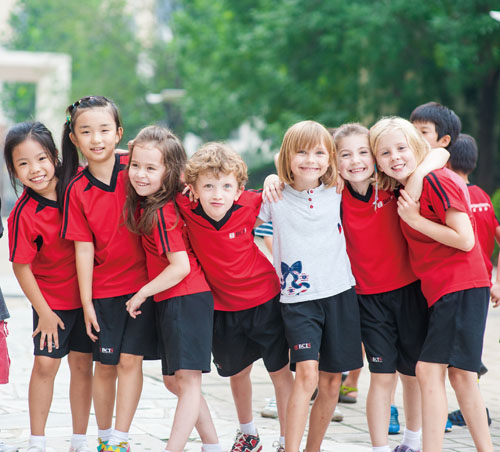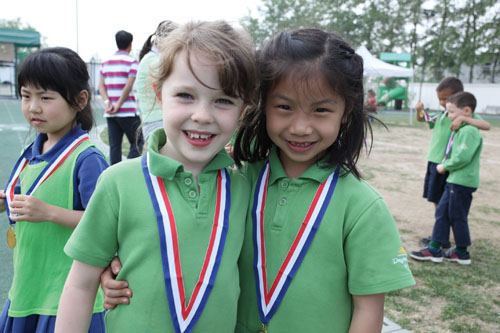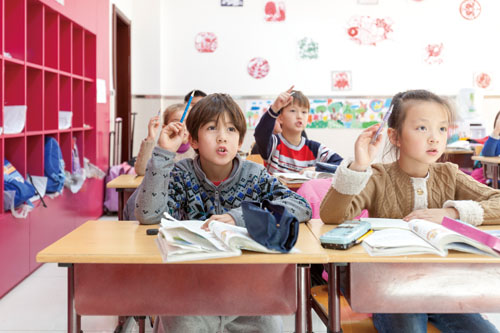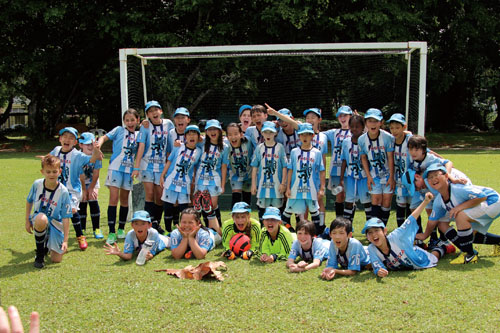
A – Air Quality
Smog is a fact of life in Beijing. Several schools such as BSB Shunyi, Dulwich College Beijing, and the Western Academy of Beijing have sports domes with air filtration systems. In addition, BCIS’s upcoming Early Education Center is the first LEED Gold standard educational facility in Beijing. But it’s not all about domes or purpose-built facilities. Look into each school’s air purification systems, testing and monitoring processes, and AQI cut-off point for outdoor activities.
B – Boarding Schools
For many families – especially those with frequently changing job postings – boarding schools can be an ideal solution. For some children, they can provide a stable environment, foster independence and maturity, and strengthen social and academic skills. Local boarding schools include Keystone, St. Paul American School, and Wellington College International Tianjin.
C – Curriculum
Beijing’s educational scene offers a huge selection of curricula and educational philosophies, including the American school system (with SAT/PSAT testing), the Chinese National Curriculum, International Baccalaureate, Montessori, Multiple Intelligences, Reggio Emilio, UK National Curriculum, bilingual programs, and more. For more information on the main educational systems, plus interviews with Beijing families, check out our School Choice Guide.
D – Demographics
Smaller schools have their advantages, but the likelihood of uneven gender ratios is higher. This can be a concern for some families, as it is normal for kids to pass through stages in their maturation when same-sex friendships are dominant. Similarly, a lack of ethnic diversity in some schools may be a concern. For example, some kids may not enjoy being the pioneering laowai at a local Chinese school.
E – Employee Turnover
The quality of the teaching staff is of paramount importance. If possible, meet the teachers who will be working with your children. International schools sometimes face higher levels of staff attrition. Nevertheless, think twice about schools with high staff turnover. It takes time for teachers to settle in, develop a rapport with their students, and build quality programs.
Facilities
Facilities and equipment at top-of-the-line international schools are second to none (see Air Quality and Sports). Language and science labs, vast libraries, black box theaters, organic vegetable gardens, koi ponds, meteorological stations, dark rooms – if you can think of it, chances are one of Beijing’s international schools has it. By contrast, the amenities and hygiene at some smaller local schools may not always be up to standard.
G – Gut Feeling
Of successful child-school pairings, parents often tell us: “It just felt right.” When you’ve narrowed down your options, and weighed all the pros and cons, you may still be left with a coin toss between schools. So trust your intuition and the impressions garnered from school tours (see Visits).Homeschooling
H for Homeschooling
It’s not compulsory for foreign children to attend school in China, so there are no legal obstacles to homeschooling. Homeschooled children can learn at their own pace, spend more time with their family, and do not have to adjust to a new learning environment. Homeschooling parents can address socialization and curricular needs through Beijing’s active homeschooling community. A Yahoo group called Beijing Homeschoolers provides support, information, and opportunities to meet other families.International Schools
I – International Schools
Beijing’s international schools are truly international. Most of them can legally only accept foreign passport holders, and many of the student bodies are incredibly diverse – so it’s not unusual to have 40 different nationalities together on one campus. The city’s best educational institutions are on par with top schools all over the world. However, their excellence in academics, manicured campuses, and state-of-the-art facilities don’t come cheap (see Tuition).
J – Join In
For new families, the school provides a vital link to the community. Many schools act as a social hub; some have parent-run cafes (such as DCB and MSB) and others offer all-day drop-in services for parents (such as at HoK).

K – Know-How
Checking up on accreditations is a vital part of the school selection process. Any school can call itself “international” or “Montessori,” but talk is cheap unless there is a stamp of approval from a recognized organization. Accreditation naturally increases the price of tuition because the process of obtaining and maintaining accreditation entails substantial costs for the schools. If the school you’re looking at isn’t properly accredited, ask a lot of questions about its curriculum and methodologies.
L – Local Schools
Since 2006, any overseas student is allowed to attend any local school – even those without an international campus. However, interacting with local schools can be especially challenging for expat families. Differing expectations, poor administration, larger class sizes (commonly up to 40 students), mismatched holidays (local schools follow the Chinese national holiday schedule), and communication difficulties are some common complaints. It’s vital that you speak Chinese, and/or interview a parent whose child attends the school to get an idea of what lies ahead.
M – Mandarin
Beijing-based families can offer their children a major advantage: fluency in Mandarin. There is a wide range of options available ranging from Mandarin as a subject all the way to monolingual Chinese programs. Bilingual programs (such as the ones at BIBA and YCIS Beijing) are increasingly popular. In addition to the extra opportunities that proficiency in more than one language brings, multilingualism also develops adaptability, self-control, and focus.
N – Number of Students
Is bigger always better? Smaller schools may lack the resources of their larger counterparts (see Facilities), and it is likely your child will have to change schools (and perhaps curriculum) as they progress from K-12. On the other hand, smaller schools are less constrained by bureaucracy, and educators are free to make more day-to-day decisions. Some young children may also be less intimidated by a more intimate setting.
O – Obedience and Discipline
You might have raised model citizens, but be sure to research the school’s disciplinary and bullying guidelines to ascertain if their policies seem workable and effective if children do step out of line. Overall, disciplinary policies at international schools are more forgiving, whereas the rote learning system at local schools requires a level of focus that often entails stricter regulations for students.
P – Parent Organizations
An active Parents’ Association (PA) can provide networking and socializing opportunities as well as offer a platform to contribute to the school and community at large. Many Beijing PAs hold annual fundraising balls and other events to benefit local charities (also see Join In).

Q – Qualifications
Accredited schools should have properly qualified staff members. Check that teachers have the right qualifications to teach the curriculum offered by the school. There is a broad range of daycare, playgroup and kindergarten options in Beijing, with significant differences in educational quality and approaches. Those with young children should pay particular attention to the qualifications of teachers and teaching assistants.
R – Recommendations
Talk to parents whose kids attend your preferred school, but also use community resources to get other perspectives on your shortlist. Contact other parents online through the beijingkids forum, Beijing Mamas, and Beijing Café (popular Yahoo Groups). Once you arrive in Beijing, draw on newcomers’ groups (see our feature on p) or simply turn up to the school gate and mingle with other parents.
S – Sports
Alongside more traditional facilities such as running tracks, football fields and gymnasiums, Beijing’s international schools feature everything from Olympic-sized pools to roof-top putting courses and equestrian arenas. If your child’s preferred sport is not available at their school, check out some of the many after-school sports programs available across the city from organizations such as O’le Sports, Flips and Kicks, and Sports Beijing.
T – Tuition
China is a developing nation, but get ready to shell out; Beijing is expensive. Inflation isn’t just affecting the housing market; the cost of education is rising as well. Budget will be your number one consideration. After all, there’s no point wasting time on schools you can’t afford. That said, tuition costs vary widely. Grade 12 in the international section of a local high school can range from RMB 50,000-100,000 while international school fees range from RMB 150,000-250,000 per year, though sibling and other discounts may be available at individual schools.
U – Uniforms and Dress Codes
Many schools opt for uniforms as a way of reinforcing school ethos, increasing identification and school spirit, and reducing differences between students. Schools without uniforms generally emphasize student choice, freedom of expression and personal responsibility, although they may enforce dress codes.

V – Visits
After you’ve read the School Choice Guide and school brochures, it’s time to draw up a shortlist and pound the pavement. If you’re unable to attend the open house or take a tour, contact the admissions departments. Most will be happy to arrange a private visit to suit your schedule. If possible, observe the students after hours and off the clock – getting on the school bus, playing on school grounds, etc. Are they orderly or rowdy, excited or exhausted? Can you see your little one fitting in?
W – Work
Some expat families have difficulty adjusting to the Chinese school system because its reliance on rote memorization can lead to hours of homework every night, even for young children. Although the Ministry of Education banned Chinese kindergartens from giving homework in 2012, many continue to assign it. The workload is generally much lighter at international schools despite their focus on academics.
X – “Xtra"Curricular
After-school activities may not be the most important factor, but they can tip the balance when it comes to deciding between two equally-matched schools. These days, extracurricular pursuits are weighed more heavily – particularly for students preparing for university. Music, arts, sports, clubs, and international honors such as the Duke of Edinburgh Award – think about what’s important to your child and their life stage.
Y – Years
Is this a short-term posting? Or are you here for the long haul? Families committed to expat life tend to prefer education systems such as the International Baccalaureate (IB) which is available worldwide. If you’re not planning to be away from your home country for long, you may not want to change curriculum in Beijing. Some – like the German Embassy School and French International School of Beijing – are backed by foreign education ministries.
Z – Zzz
Distances in Beijing are often exacerbated by extreme traffic conditions. Cross-city commutes can mean brutally early rising times. So, the proximity between home and school is a key consideration for many parents. Before making your final choice, try to run through the commute to each of the schools you are interested in during peak times. Long transit times can wear your kids out, especially if they have a lot of homework to do after they get home.
This article originally appeared in the beijingkids Home & Relocation Guide 2014. To get your free copy, email distribution@truerun.com or view it online at Issuu.
Photos: Sui and courtesy of BCIS, Daystar, and Harrow



